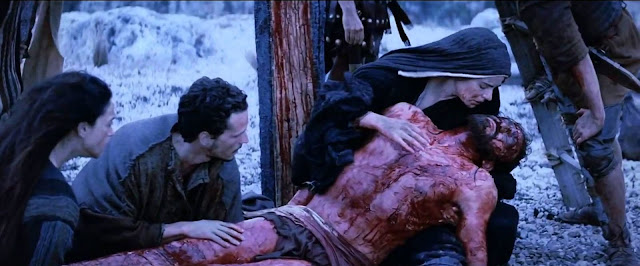Chaplain
Member
For many, Good Friday and Easter Sunday is a time of celebration. It is a time when God demonstrated His love for humanity by taking on human suffering and defeating sin and death on the cross. As Christians, we have been called to go out into the world and share this message because it is the greatest message ever told: that God would willingly encode himself into a human life and offer us a new way of living. Happy Good Friday and Easter Sunday!
The present task of the Church is not only to share the sufferings of Christ, but in doing so to share and bear the sufferings of the world and, indeed, to discover that those vocations are two ways of saying the same thing; so that the pain of the world, which was heaped once and for all on to the Messiah on the cross, is now strangely to be shared by those who suffer with him. The Church is not insulated from the pain of the world, but is to become for the world what Jesus was for the world, the place where its pain and grief may be focused and concentrated, and so healed. (Historian and New Testament Scholar N.T. Wright)
Good Friday
SaturdayThe Forgotten Day
Resurrection Sunday
The present task of the Church is not only to share the sufferings of Christ, but in doing so to share and bear the sufferings of the world and, indeed, to discover that those vocations are two ways of saying the same thing; so that the pain of the world, which was heaped once and for all on to the Messiah on the cross, is now strangely to be shared by those who suffer with him. The Church is not insulated from the pain of the world, but is to become for the world what Jesus was for the world, the place where its pain and grief may be focused and concentrated, and so healed. (Historian and New Testament Scholar N.T. Wright)
Good Friday
(For a full account of the events of this day, see Matthew 27:161, Mark 15:147, Luke 23:156, John 18:2819:42.)
On Thursday night in Gethsemane, Jesus was arrestedbetrayed by one of his disciples and abandoned by the others. The chief priests and the Sanhedrin called for secret trials in the dead of night, and the verdict handed down was that Jesus would be crucified. This is something the Roman prefect, Pontius Pilate, has to execute. And reluctantly, he does.
After a severe beating, Jesus is nailed to a cross where he remains for six hours until dead. Never before or since has more been lost and gained at the same time. The world gained the atoning sacrifice of Christ. But for those present, either the significance of the moment is lost on them or their hearts break as the One they thought to be the Savior of the world dies at the hands of Rome. They cant stop it, and they dont realize its for them. They hoped in him, and though hed told them he would suffer many things and rise three days later (Mark 8:31), how could they have possibly known this was what he meant?
- "Is there anywhere evidence of the existence of a God whom I can trust with this deep issue? Yes. At the heart of Christianity there is a cross. The central claim of Christianity is that Jesus Christ is God incarnate which raises the question: what is God doing on a cross? At the very least that shows me that God has not remained distant from human suffering but has become part of it. Furthermore, Christ rose from the dead, which is a guarantee that there is to be a future judgement. This is a marvellous hope, because it means that our conscience is not an illusion, and those who terrorise, abuse, exploit, defame and cause their fellow humans untold suffering will not get away with it. Atheism has no such hope--for it ultimate justice is an illusion." (Oxford Professor John Lennox)
- "At the supreme moment of his dying Jesus so identified himself with men and the depths of their predicament and agony that no man can now sink so low that God has not gone lower." (Scholar Os Guinness)
- "In his crucifixion, therefore, Jesus identified fully (if paradoxically) with the aspirations of his people, dying as the king of the Jews, the representative of the people of God, accomplishing for Israel (and hence the world) what neither the world nor Israel could accomplish for themselves. To the question Why did Jesus die? there are traditionally two sorts of answers: the theological (He died for our sins), and the historical (He died because he fell foul of the authorities). These two answers turn out to be two ways of saying the same thing. In Israels final national crisis the evil of the world, ranged against Gods people, and the evil within Gods people themselves, came to a head and, as a matter of history, put Jesus to death. As the story of the exodus is the story of how God redeemed Israel, so the story of the cross is the story of how God redeemed the world through Israel in person, in Jesus, the Messiah." (Historian and New Testament Scholar N.T. Wright)
- "God overcame our evil by justifying us only because he first condemned it in Christ, and by redeeming us only because he first paid the ransom price. He did not overcome evil by re- fusing to punish it, but by accepting the punishment himself. At the cross human evil was both punished and overcome, and Gods mercy and justice were both satisfied." (Theologian John Stott)




SaturdayThe Forgotten Day
(For a full account of the events of this day as found in the Gospels, see Matthew 27:6266.)
Less is written about the Saturday following Jesuss crucifixion than any other in the scope of this week. Yet what makes it unique is that this is the only full day in history where the body of Christ lies buried in a cave.
Yesterday, he was crucified. Tomorrow, he rises from the grave. But what about today? Though we may not make much of this day, when we look at the few verses the Gospels give us about it, we find it was by no means forgotten by the chief priests who had handed Jesus over to death. During his earthly ministry, Jesus repeatedly said he would die in Jerusalem at the hands of the chief priests, yet on the third day rise again (e.g., Matt. 12:40; Mark 8:31; 9:31; 10:34).
Of course, the chief priests scoffed. But they didnt forget it. On the day between Good Friday and Easter Sunday, Jesuss prediction preoccupies their thoughts such that they simply cant leave it alone. Matthew 27:6266 tells the strange story of how they cant dismiss out of hand the possibility that Jesus might know something they dont.
Resurrection Sunday
(For a full account of the events of this day, see Matthew 28:120, Mark 16:18, Luke 24:153, John 20:121:25.)
Early Sunday morning, some of Jesuss friends set out for his grave to anoint the body of their friend and teacher. When they arrive, however, they are greeted by what one Gospel writer calls a man dressed in lightning. He tells them Jesus is not there, as he said. He is risen.
In the week leading up to his death, the Good Shepherd went out to meet the wolves of judgment, sin, and deathand he did so with all authority. One might wonder, what good has it ever done anyone to die for some cause? This is the glorious beauty of the gospel. Jesus didnt die as a martyr for a cause. He was never in the wrong place at the wrong time. He was never at the mercy of anyone. He lived, died, and was buried because he meant to be.
No one took his life from him. He laid it down. For whom? For his flock, his people.
And he laid it down only to take it up again (John 10:18). The point of the cross was not just to die, but to die and rise again, defeating the prowling wolves of sin and death themselves.

- The simple, unsophisticated nature of the Gospels attests to their reliability rather than to their being fabrications. It isnt unusual to read skeptics who point out alleged contradictions or lack of harmonization in, say, the Gospel accounts of the Resurrection narratives. But although the numbers of women, for example, differ from Gospel to Gospel, no evangelist asserts that only so many women went to the tomb. And even when it appears in Johns Gospel that only Mary Magdalene was at the tomb, she implies that she wasnt alone: We dont know where they have put him (John 20:2). Now, even if actual discrepancies existed in the Gospels, no good historian rejects a document because of conflicts in secondary matters. What is beyond doubt is that there is a general core of agreement among the Gospels. In any event, its clear that the Gospel writers were not plotting or fabricating these stories. Otherwise, they would have attempted to be more uniform in their accounting. For example, a fabricated account most likely would not have relied on women as the first witnesses of the Resurrection because of their typically lower status in Jewish society. (Philosopher Paul Copan)
- "The tradition concerning the empty tomb is so important an element in each of the four Gospels (Matt. 28:1-10; Mark 16:1-8; Luke 24:1-11; John 20:1-10) that it must be considered to have a basis in historical fact. The story is told from different aspects, and includes the divergence on minor points of detail which is so characteristic of eyewitness reports. Curiously, all four Gospels attribute the discovery of the empty tomb to women. At that time the testimony of a woman was virtually worthless. In first-century Palestine this would have been sufficient to discredit the accounts altogether. If the reports of the empty tomb were invented, it is difficult to understand why their inventors should have embellished their accounts of the "discovery" with something virtually guaranteed to discredit them. Were the first Christians really that stupid? Why not attribute this discovery to men, if the story was just invented? The most obvious explanation is that it was such a widely accepted tradition within the early church that the discoverers of the empty tomb were women that the idea could not be modified, even to make the story of the discovery more plausible." (Oxford Theologian Alister E. McGrath)
- "Mary turns round and sees Jesus himself, and in one of those typically Johannine moments of irony thinks he is the gardener as of course he is: the new Adam in the new creation. And he calls her by her real name, her ancient Hebrew name, Miriam, the name of Moses sister who sang her wild song of triumph after watching Israels God defeat the Egyptians in the Red Sea. Something of that may be echoing in this story as well, with Jesus as the new Moses who has led the way through the dark waters of death and is now leading the way home to the promised land." (Historian and New Testament Scholar N.T. Wright)

- For the moment Peter was only amazed at the empty tomb; but then things began to happen in Johns mind. If someone had removed Jesus body, if tomb-robbers had been at work, why should they leave the grave clothes? And then something else struck Johnthe grave clothes were not disheveled and disarranged; they were lying there still in their foldsthat is what the Greek meansthe clothes for the body where the body had been; the napkin where the head had lain. The whole point of the description is that the grave clothes did not look as if they had been put off or taken off; they were lying there in their regular folds as if the body of Jesus had simply evaporated out of them and left them lying. The sight suddenly penetrated to Johns mind; he realized that had happenedand he believed. It was not what John read in scripture which convinced him that Jesus had risen; it was what with his own eyes he saw. (Professor of Divinity and Biblical Criticism at the University of Glasgow William Barclay)
- Historical argument alone cannot force anyone to believe that Jesus was raised from the dead; but historical argument is remarkably good at clearing away the undergrowth behind which skepticisms of various sorts have been hiding. The proposal that Jesus was bodily raised from the dead possesses unrivaled power to explain the historical data at the heart of early Christianity. (Historian and New Testament Scholar N. T. Wright)

